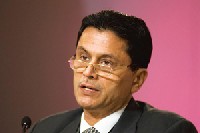Securities & Exchange Board of India (Sebi) Chairman C B Bhave has for the first time publicly backed the Bimal Jalan committee report on the working of capital market infrastructure institutions (MIIs). The report was placed in the public domain on November 24 and received scathing criticism from industry players. The committee, headed by the former Reserve Bank of India governor, recommended stringent ownership norms for stock exchanges.
The committee, headed by the former Reserve Bank of India governor, recommended stringent ownership norms for stock exchanges.
Defending the report, Bhave said: "The Jalan committee raises very important issues. (It would) be better if we address those issues now. Management compensation can't be linked to profit," Bhave said. He was speaking today at an event organised by the National Securities Depository in Mumbai.
The Jalan committee has suggested keeping profits made by stock exchanges under strict oversight. It voiced concern over super-normal profits, although it stopped short of capping profitability.
The panel also said the pay of exchange brass should be fixed without variables linked to commercial performance and that MIIs should not be listed.
The report also suggested that only banks, insurance companies and domestic financial institutions - which fall under the category of public financial institutions - with a net worth of Rs 1,000 crore be roped in as anchor investor.
It said they be allowed to hold 24 per cent stake in an exchange, with a clause to reduce this to 15 per cent in 10 years. All others can hold a maximum of 5 per cent.
"If profit maximisation for MIIs is not to be encouraged, we need to put some mechanism in place. They cannot be listed," Bhave said.
He added, "This is not just restricted to the area of stock markets. Take, for example, microfinance, where now people are talking about how much profit is good for such institutions.
The committee report is one of the ways to answer this question. The capital market can provide a lead here."
Bhave felt that stock exchanges are not mere trading engines if they can be subjected to free market forces. "They have some embedded regulatory functions that cannot be segregated from trading engines," he said.
Many foreign investors have picked up equity in the Bombay Stock Exchange, India's oldest stock exchange, in the hope that its shares would be listed on stock markets.
The suggestions will impact BSE, which had planned to launch its initial public offering by March 2011.
BSE will also have to bring down its holding in the Central Depository Services from the current 54 per cent to 24 per cent in three years, if the Jalan committee suggestions are implemented. Rival National Stock Exchange has just over 25 per cent stake in National Depository Services.
Sebi has invited comments on the panel's report by December 31.






 © 2025
© 2025